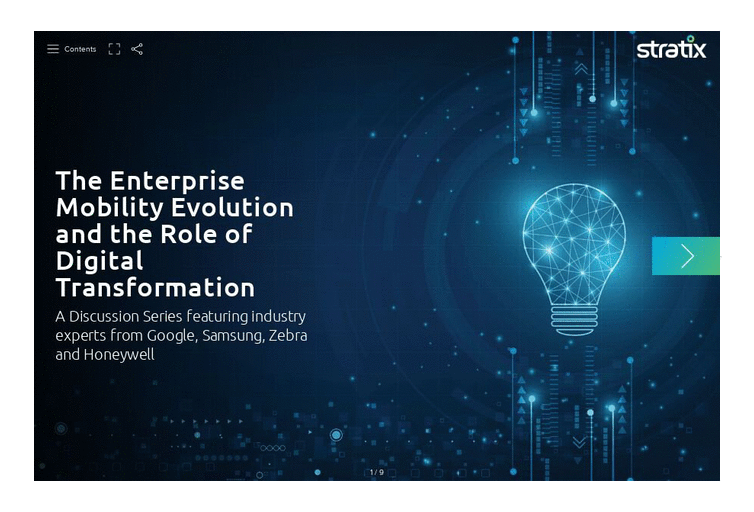Mobile, the Presentation Layer to Digital
Written by Sandra Tansky
4 Min Read
Blog
Conversations About Digital Transformation: Google
Smart, effective enterprise mobility is comprised of many touchpoints involving providers of industry-leading devices, apps, services and more. Each has a unique and valuable perspective on the most important aspects to achieving success through enterprise mobile technology deployments. Recently, we conducted a series of in-depth discussions with some of the biggest names in enterprise mobile technology to better understand the seismic shifts that are bringing about this digital transformation.
We sat down with Sean Ginevan, Head of Global Strategy & Digital Partnerships, Android Enterprise at Google. Google’s Android Enterprise Recommended initiative offers a comprehensive shortlist of Google-verified devices, providers and more who meet very strict and specific enterprise-grade requirements. Google’s Android operating system has been at the forefront of the paradigm shift to ubiquitous mobile device usage in both the consumer and the professional sectors. From his perspective, Ginevan believes “digital transformation is ultimately a foundational change for delivering value to customers. How that manifests itself may change depending on what business goals you’re trying to execute against. At a very broad level, it’s how to use technology, people and process to essentially change how businesses perform.”
“Digital transformation starts with understanding your customer journey and how digital can streamline it,” he continues. “Enterprises must know how customers and employees interact with your organization and then work in reverse to understand where all of these different digital technologies can actually make processes more effective.”
Google believes that this evolving landscape has naturally led to sourcing new business models and methodologies – from the proliferation of e-fulfillment for meals and groceries to AI-fueled recommendation engines shaping online purchases. It’s all in the name of personalizing our digital experiences in real-time.
“For the Android team,” he states, “we ask ourselves how we can bring these digital experiences I described into the physical world? How can we ensure the right types of devices are available to retailers that want to bring personalization into their store? How do we make it easy for companies to deploy tens of thousands of devices that access digital infrastructure? How do we make sure the security tools are there to protect sensitive data accessed from mobile devices? How do we allow employees to use their own devices to access digital workflows while not putting data at risk? Our goal is to ensure that a company can use the Android platform with confidence, and that its extensible, scalable, and secure enough to meet any use case an enterprise might envision.”
One area in particular where Google’s Android OS is especially valuable to enterprises is security. According to Ginevan, “Security is foundational to Android and we build it into the hardware layer. That hardware helps validate that the OS hasn’t been tampered with, and that the keys that encrypt data on the device are kept safe. In addition, Google uses machine learning models to analyze all of the apps in the Google Play Store as well as apps the user may have tried to install off the web or via other sources. When we look at manageability of Android as part of that security framework, we make sure users are able to do the right things on that device with the right policies and configurations in place.”
Ultimately, digital transformation means that enterprises must innovate by understanding and incorporating new and emerging technologies in order to derive the most benefits for their organizations. “We see a lot of interesting tools being used from the platform” notes Ginevan. “We talked about AR and Google Glass. Another one to note is machine learning and artificial intelligence. We’re seeing really interesting use cases in field services where customers built a custom machine learning model to understand things like the identity of bugs. With better identification, you know what kind of treatment plan is required and that helps improve the efficacy of treatment.”
When it comes to enterprise IT teams leveraging these technologies to enact their own digital transformation, Ginevan cautions that enterprises “must be sure they have the foundations already in place before starting their transformation. If you don’t know what data you have available in your organization and you don’t understand how to integrate that data (in real-time) from various sources in one place, you are playing from behind. It’s essentially dumping a Ferrari engine into a car that doesn’t have any wheels on it. So, now is the time to start getting that foundation in place and then you can start experimenting and iterating with these new technologies.”
Putting that foundation in place requires smart technology partnerships. The value of these partners is obvious to Ginevan:
“Partners not only understand the latest in technology and how to make sure it gets applied well in the organization; they also likely understand your business processes very well. Partners like Stratix can bring an outside perspective to help with the innovation process. I think it’s important to realize that not everything in digital has to be done internally. Certainly, building agile development processes helps from a cultural perspective, but you can leverage partners to experiment and find new tools that are already out there, so you don’t have to rebuild the wheel.”
Ultimately, these partnerships enable enterprises to realize the true value of better enterprise mobility and the ways in which it powers digital transformation.
“First, it’s really important when thinking about digital transformation you don’t approach it as a pure technology problem,” says Ginevan. “You need to take an overall look at your business operations. Mobile is the presentation layer to a company’s digital infrastructure. It’s also the means for how the data you’re gathering from the physical world becomes actionable by your employees.”
Be sure to read the rest of our conversations about digital transformation in our eBook The Role of Enterprise Mobility in Digital Transformation for valuable insights on how the evolution of enterprise mobility is changing the business landscape.

The Role of Enterprise Mobility in Digital Transformation
We interviewed industry experts to get their most valuable insights including real world examples of successful, mobile-led transformations.
Read the eBook












